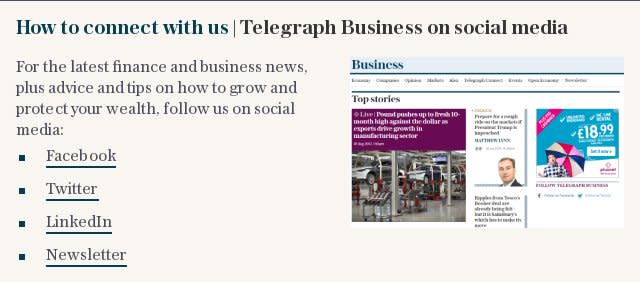Raise rates to stop inflation surging, says Bank of England policymaker
Interest rates should go up to prevent inflation rising too far, Bank of England Policymaker Michael Saunders has warned.
A slightly higher interest rate would still provide stimulus to the economy but at a lower level, he said, and would not risk squashing economic growth.
“We do not need to be putting the brakes on so much that the economy weakens sharply. But our foot no longer needs to be quite so firmly on the accelerator in my view,” said Mr Saunders, who voted to raise rates from 0.25pc to 0.5pc in August's policy meeting.
“A modest rise in rates would help ensure a sustainable return of inflation to target over time.”
He argued that interest rates can be cut again if the economy slows down or if the Brexit process is bumpier than anticipated.
“We should not maintain an overly loose stance as insurance against this scenario. Rather, we should be prepared to respond as needed if it happens,” he told an audience in Cardiff.
Officials including the Bank’s Governor Mark Carney have explained that the Monetary Policy Committee has to balance the trade off between growth and inflation.
So far a majority on the committee have judged that there is enough slack in the economy to keep rates low in an effort to encourage economic growth without generating higher inflation.
In part that is because the recent rise in inflation has been caused by the weakness of the pound rather than any domestic pressures on prices.
But Mr Saunders, a former economist at Citibank, fears that inflation is now too high to continue on this course, with domestic factors also pushing up prices.
“The prospective trade off is beyond my limits of tolerance, with the likelihood of an early elimination of slack and an extended period of above-target inflation,” he said, noting that unemployment is now below the Bank’s estimate of the equilibrium rate, the level below which inflation should start to pick up.
Mr Saunders added that he believed the economy’s underlying rate of growth was stronger than two recent weak quarters would suggest.
As evidence he notes that companies are increasingly struggling to find the workers they need, part-time workers are getting more hours and manufacturers have less spare capacity than usual, all indicating that there is little room for the economy to grow more without generating extra inflation.
“Overall, I suspect that the economy will not be too bad in coming quarters, probably growing a little faster than the MPC’s central forecast and probably a little above trend,” he said.
“Consistent with this outlook and trends in business activity, firms’ hiring intentions remain a bit above average, suggesting that labour demand will continue to outstrip labour supply.”
Mr Saunders and fellow external member of the MPC Ian McCafferty both voted for higher rates in August’s meeting, but were outvoted by the rest of the eight-strong committee.

 Yahoo Finance
Yahoo Finance 

